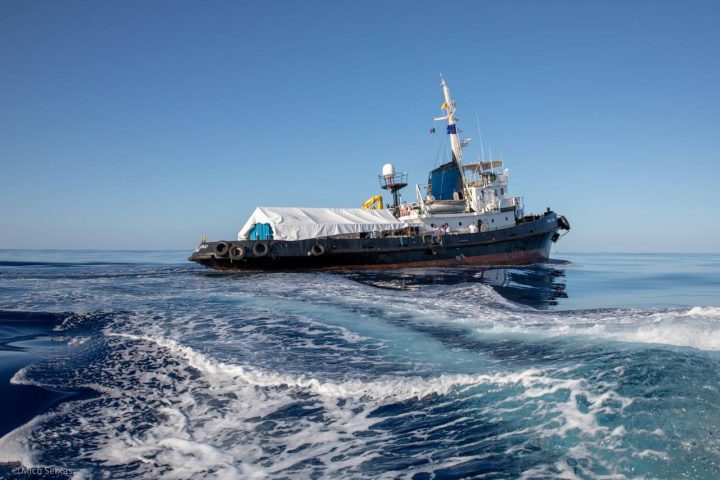Migration policy, civil disobedience and tangible gestures of solidarity. We talk to Maso Notarianni, a journalist, director of Italian association ARCI and member of Mediterranea Saving Humans.
How did the launch of the Mediterranea Saving Humans project come about?
The idea has been in many people’s heads for a long time. The expulsion of NGOs from the Mediterranean gave us the impetus to firm up our reaction of civil disobedience to Italian and European policies towards migration and the criminalisation of solidarity. At the beginning of spring we started looking at the feasibility of the project and during the summer we went to work, and bought and modified a tug boat, called the Mar Ionio. Our launch took place at the start of October. The project brings together many disparate groups that have decided to work together. Our promoters are ARCI; Bologna’s Ya Basta association; the online magazine I Diavoli; Rome’s Esc social centre; the social enterprise Multivolti based in Palermo; the NGO Seawatch and the Don Gallo Community in Genoa. I’d also like to add that without the help of Erasmo Palazzotto, Nicola Fratoianni, Rossella Muroni, Alessandro Metz and Nichi Vendola, who acted as guarantors on the loan from Banca Etica, the project would never have got off the ground.
How has the project developed?
Many other groups have joined our initial promoters. These include parishes, cultural groups, social centres, artists, writers, and individuals. Mediterranea is a network that is open to everyone. To take part and suggest initiatives, all you need to do is either go on our site or our Facebook page and leave a message. We’ve created an amazing network of support linking those who are at sea with those on land. We’ve also formed a highly-skilled group of skippers who take part in our missions as volunteers alongside activists.
In all of our missions, we have at least one support boat that accompanies the Mar Jonio. On board, besides the crew and medical staff, we also have journalists, who are crucial in helping our mission of monitoring, witnessing and reporting on the situation. We also work with the Proactiva Open Arms and Seawatch boats.
You have taken part in two missions and will shortly set out on your third. What has the experience taught you?
It has taught me a lot. Navigating for days in the Mediterranean really brings home the absurdity of Italian and European policies towards migration. Above all, you experience first hand how awful it is to be at sea in a dinghy or small boat. It gives you even greater energy to raise awareness of this madness. The experience creates very strong bonds between those who share it.
What happened during the missions you took part in?
On my first mission, we came across a small boat heading towards Lampedusa. We drew up alongside and asked if they needed help, but they told us that they had two engines, stocks of food and water and that they preferred to continue.
We picked up many alerts which oblige the nearest craft to help those in difficulty. Unfortunately, we often came to the conclusion that the alerts were false and designed to send us where we were not needed. We also found that rather than sound a general alarm, only the Libyans were alerted so that they could go and round up the castaways. This takes place despite the International Maritime Organisation not recognising Libyan ports as safe.
I’d also like to add an important fact: Europe has given Turkey six billion euro to block refugees and Italy is funding the Libyan Coast Guard and groups who are, in effect, bandits, to build prison camps. The project to open humanitarian corridors by the Community of Sant’Egidio with the Federation of Evangelical Churches and the board of the Waldensian Church raised 250 million euro and brought a thousand people to Italy, guaranteeing them shelter for a year. With the millions given to Turkey and Libya we could have guaranteed safe and human conditions for at least 240,000 people. Like the closing down of SPRAR, the choices the West is making – without forgetting what Trump is doing in the U.S. – seem to me a clear demonstration of a lack of any desire to solve the problem. Instead, it seems more important to increase tension, fear and mistrust towards migrants.
Earlier, you mentioned the extraordinary levels of solidarity that you have encountered. Can you tell us more about what you have done so far and your future projects?
We really didn’t expect so many disparate groups to get involved, from parish church groups to social centres. We are now seeing two or three initiatives a day raising awareness of our project and raising funds all over Italy. People organise everything and call us and we go wherever we are invited. Another initiative by Michela Murgia with the same aim has seen a group of actors, writers and singers tour the country with a play called “La via di terra.” We’re aiming to continue lots more local events such as this. Our invitation to everyone is clear: “Come on board Mediterranea Saving Humans.”
Translation from Italian by Malcolm Gilmour










